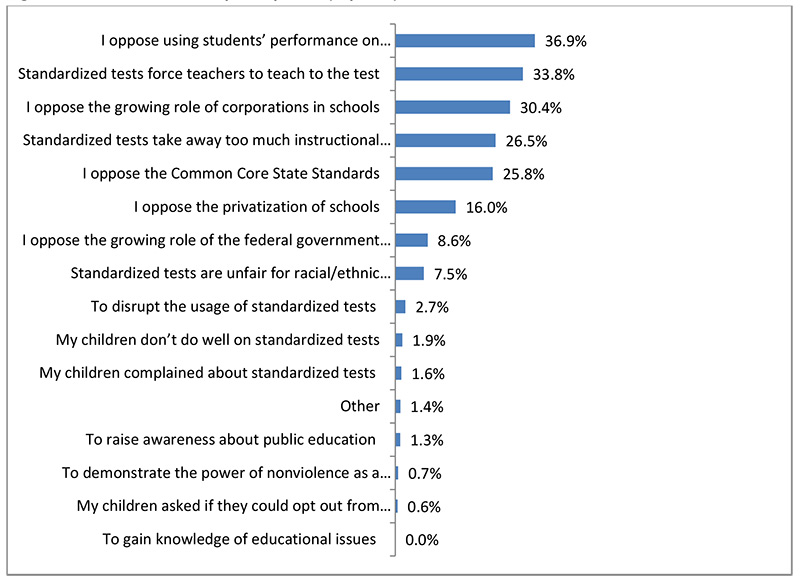What's Driving the Opt-Out Movement?
The belief that high-stakes testing promotes rote learning and is unfair to teachers, a TC survey finds

Download report: “Who Opts Out and Why?
Teachers College unveiled the findings of Who Opts Out and Why?—the first national, independent survey of the “opt-out” movement—which reveals that supporters oppose the use of test scores to evaluate teachers and believe that high-stakes tests force teachers to “teach to the test” rather than employ strategies that promote deeper learning. The new survey also reports concern among supporters about the growing role of corporations and privatization of schools.

Oren Pizmony-Levy, Assistant Professor of International & Comparative Education
“For activists, the concerns are about more than the tests,” saidOren Pizmony-Levy, TC Assistant Professor of International and Comparative Education, who co-authored the study withNancy Green Saraisky, Research Associate and TC alumna. “We were surprised that the survey reveals a broader concern about corporate education reform relying on standardized test-based accountability, and the increased role of ‘edu-businesses’ and corporations in schools.”
Who Opts Out and Why? also reveals that opt-out proponents oppose high-stakes, standardized testing because they believe it takes away too much instructional time.
The survey follows recent reports that the opt-out movement in New York has neither grown nor faded. In its July 29 report on 2016 standardized test scores, New York State disclosed that about 21 percent, or an estimated 250,000 of the approximately 1.1 million eligible public school students across the state, declined to take the tests. These figures do not significantly differ from the previous year, when New York State led the nation in combined math and English Language Arts test refusals.
Among the national survey’s 65 questions, respondents were asked to pick the two top reasons why they participated in opt-out activities. The answers revealed that:
- 36.9 percent said they oppose using students’ performance on standardized tests to evaluate teachers;
- 33.8 percent said they believe standardized tests force teachers to “teach to the test” by using drilling and worksheets to promote memorization of test answers rather than more complex, inquiry-based learning strategies;
- 30.4 percent said they oppose the growing role of corporations in schools;
- 26.5 percent said they believe standardized tests take away too much instructional time;
- 25.8 percent said they oppose the Common Core State Standards (CCSS); and
- 16 percent said they oppose the privatization of schools, a concern that is closely tied to fears about the growing role of corporations in public schools.

Nancy Green Saraisky (Ph.D. '15), Assistant Adjunct Professor
“The survey’s quantitative and qualitative data, which include detailed written answers by respondents, give the first comprehensive and nuanced insights into the often complex attitudes and motivations of opt-out participants and sympathizers,” said Green Saraisky. “The written responses especially reveal that the opt-out movement is offering a broad critique of current education reform that focuses on accountability based on standardized testing.”

Motivations for participation (top two). Click here to zoom.
Pizmony-Levy and Green Saraisky designed and electronically administered Who Opts Out and Why?through links on the webpages and social media channels of opt-out groups. From 1,641 responses gathered from 47 states, from January through March 2016, the survey also gives a more detailed picture of who the movement’s supporters are and their background.
It shows that opt-out proponents reject not only the popular narrative that public education in America is failing, but also the notion that, even if it were, more standardized testing would fix it. “People in the opt-out movement are not saying the whole system is broken,” said Green Saraisky. “They’re not anti-testing; they’re anti-standardized testing.”
Respondents believe that opting out “is about political challenge to current educational reform,” Pizmony-Levy said. “Policy makers need to take opt-out supporters seriously and pay attention to what motivates them and what ideas they bring to the table.”
The complete Who Opts Out and Why? survey and results can be downloaded here.
Published Tuesday, Aug. 9, 2016 What's Driving the Opt-Out Movement? | Teachers College Columbia University:
